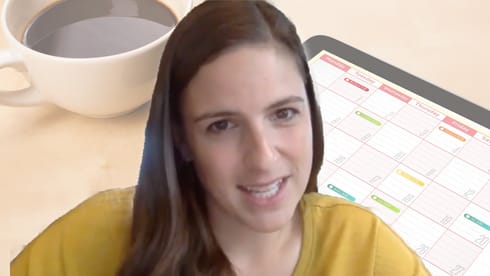Homeschool Mama, You're Not a Teacher
Are you afraid of homeschooling because you know you’re not as smart or prepared as the teacher-down-the-road?
We homeschooling moms can be an easy marketing target. Day schools promise so much more than we could ever hope to provide. They seem to run without a hitch and make us doubt that what we are doing at home can begin to compare.
Sometimes they’re right. Sometimes classical day schools are a good choice.
But sometimes it’s just marketing propaganda.
What Is a Teacher?
One advantage schools often claim to have over homeschooling is their efficiency. One teacher teaching 20 kids is better than one teaching 2 or 3 or 5, right? One teacher can master one subject and the students can be herded from classroom to classroom, receiving instruction from specialists in a controlled environment. It is an efficient use of resources, to be sure.
But efficiency is not all that matters.
The dictionary defines the verb teaching as
- To show or explain to (someone) how to do something
- To give information about or instruction in (a subject or skill)
- To give such instruction professionally
It comes from the Old English word meaning to ‘show, present, point out.’
A teacher shows, tells, explains – makes plain and clear the subject matter.
One of my favorite books on teaching is the classic by Gilbert Highet: The Art of Teaching. Writing in the 50’s, he never says anything about homeschooling or other alternative methods of education, but he does comment on the different modes of teaching:
It is far easier to give two one hour lectures to classes of fifty or sixty than to tutor one or two pupils for two hours, questioning, objecting, remembering, following up, arguing, defending yourself, and counter attacking and always moving toward a definite end which must not be hurried or overemphasized. And after giving two such tutorials, you are exhausted.
As homeschooling families, we have the opportunity to take advantage of the best model, which the logistics of the classroom forbid: tutoring. Remembering, following up, questioning one or two students at a time, taking those individuals toward a definite end without hurrying them or overemphasizing the point. And do you see that last sentence? It’s exhausting work, but effective work.
What is tutoring?
The dictionary defines tutoring as to “act as a private teacher to (a single student or a very small group).”
The word comes to us from Latin tueri ‘to watch, guard.’
The contemporary classroom teacher, then, is a master of the material, showing it and attempting to make it comprehensible to their class. A tutor, however, is a watcher, a guarder of the way, shepherding the student along a chosen path – watching the student more than the material, bringing in the helps and materials needed to keep momentum, while traveling alongside.
There is nothing wrong with teaching, but the schools are right: teaching is not homeschooling’s strength. Homeschooling’s strength is in the depth of relationship and the insightfulness of personal guidance.
Tutoring is not making everything completely personalized and individualized for each student, as if history and tradition and logic had no bearing on what is studied and when. Instead, as tutors, we have the opportunity to meet the child where he’s at rather than where generic standards say he should be. The only way he’s actually going to climb that rock wall is if he takes the next step right above him – shouting and pointing at the very top rock or painstakingly demonstrating how to properly climb the rocks below him is not actually helpful.
Instead of being teachers focused on communicating specific material over the course of a year, we are tutors, coaches, mentors, disciplers. We will have better success if we see our mission not as trying to get through curriculum or achieve certain test scores but as guiding the beginning of a human being’s journey on the path of virtue. The path itself is as old as the world – not individualized – but the coaching and mentoring done to keep the child on the path and to show him how to travel it successfully is individualized and primarily relational.
As mother-tutors, we have a small flock that we shepherd in the way they should go. We need to nurture and strengthen our relationships with our children, because that is where our advantage and our true calling lies. Our job is to bring in what life-giving nutrition each requires to grow and develop, but we don’t have to be the producers or pre-digesters of that feed. Our role is to watch, guard, tend, prod, and guide. Our role is consume life-giving soul- & mind-food ourselves so we can model, lead, and keep up. Shepherds know their flocks – the weaknesses, strengths, temptations, and tendencies – and they watch the backs of those under their care.
Homeschool mama, you don’t need to be an expert, a specialist, or a professor. You need to be a watcher, a learner, a coach, intent upon your children’s needs and modeling the more excellent way for them.


